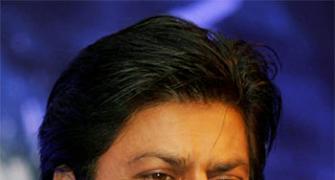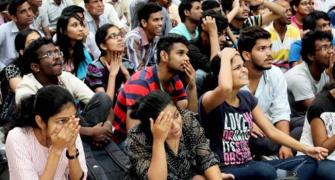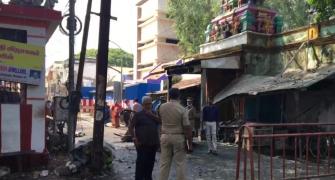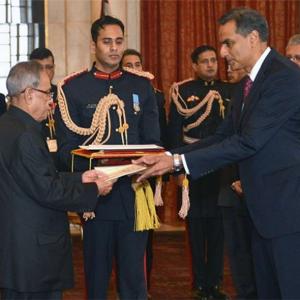"The DTE must remember that all the three types of questions: easy, medium and difficult carry equal marks. The DTE cannot decide that a candidate who attempted an easy paper would get less marks."
"Did we ask for an easy paper? We solved what we got. We prepared well to solve a tough paper too just like the other slots. Why are we being punished for being fortunate enough to get an easy paper?"
Thousands of students from Maharashtra are disappointed with the Directorate of Technical Education's explanation of normalising scores in the Common Entrance Examination held on March 14 and 15, 2015 to ensure fair play.
We bring you their voices and concerns. Read on
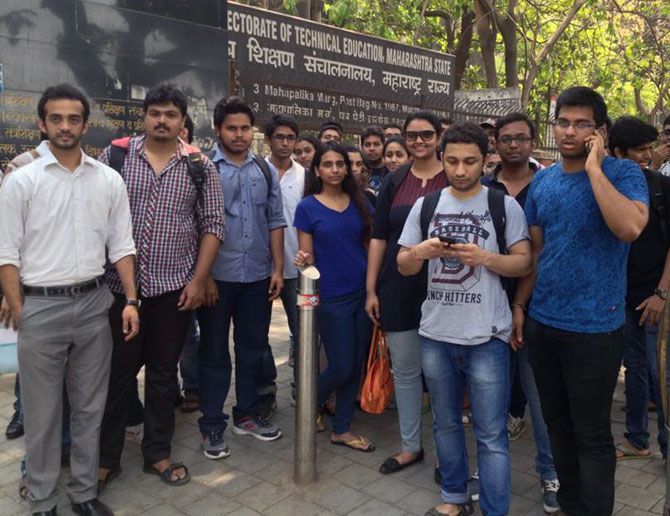
Ever since the Common Entrance Test for MBA and MMS programmes in Maharashtra took place on March 14 and 15, 2015 across four slots, two each day (at 10 am and 4.30 pm respectively), candidates from across Maharashtra have been voicing their concerns about the examination and the way it was conducted.
The test is conducted by the Maharashtra government.
Candidates complained about technical glitches during the exam, wrong or confusing questions and alleged mass copying in some centres.
At one point, they wanted to request a revaluation or a re-examination (refer external link).
After the results were announced on Wednesday, March 25, the chorus of dissent has only grown as many are shocked at the poor marks they have got.
Nearly 1200 students have signed an online petition demanding an explanation and solution (refer external link).
Admission applications to several leading business schools in the city are expected to close this week so the state government must move fast to rectify any mistakes.
On March 26, a group of students met the Director of Technical Education (DTE) in Mumbai to seek an immediate solution but were asked to come the following day.
On Thursday evening, the DTE website released the raw scores of all students and their percentile, which further revealed the discrepancies -- for instance, the final scores of students who appeared from slot 1 were reduced by 30 marks which led to a fall in percentile.
Also there were discrepancies in the number of candidates present for the exam (57012) and the cumulative number of candidates whose scores were calculated (57224). (Refer table here)
Will the DTE explain the increased number of students?
On March 27, a group of 100 plus students from Mumbai met Vinod Tawde, minister of state for primary, higher and technical education to request for an enquiry which led them to new findings.
"Mr (Vinod) Tawde informed us that 600 students from slot 1 scored above 160 while only 60 students from slots 2, 3 and 4 put together scored above 160. Hence, during the normalization stage (the individual score is subtracted by a mean value and divided by standard deviation value), it was ensured that students from slots 2, 3 and 4 were not at a disadvantage," says Vikas Shah, an MBA aspirant from Mumbai.
"A DTE official informed us that they have kept slot 2 as the base slot. According to them, slot 1 was easier that's why our marks are reduced. Slots 3 and 4 were difficult, so they were given bonus marks.
The equi percentile formula they have used is a standard formula and nothing is wrong in that. However, it can be applied only when all the four sections have equal level of difficulty.
"The DTE must remember that all the three types of questions: easy, medium and difficult carry equal marks. The DTE cannot decide that a candidate who attempted an easy paper would get less marks," adds another student from Mumbai.
"We accept Slot 1 was the easiest of all the four slots, but that is not our mistake," adds Shah.
Naturally, the explanation they received from the DTE office hasn’t gone down well with the students either who are now expecting a fair decision.
The problems
Nayan Savla who appeared for the exam from slot 1 at 10 am faced the following problems
"My PC hung up after 1 minute of starting of exam. I had to restart my PC four times during exam. After 1.5 hours, the PC shut on its own."
"The paper for slot 1 was easy and I'm not satisfied with result. I see great level of discrepancy in the final marks and percentile calculated. I was clearly expecting above 140+ on 181, but have secured 96 on 200 with 70 percentile."
"There were four slots of the examination. Slot 1, which I appeared for, was easy. But there were several questions that were wrongly printed. Taking away the 19 questions which the DTE confirmed were wrong, on March 21 (external link) most of us were sure of scoring well over 150 out of 200.
"We were told that equi percentile approach (click here for external link) will be used to normalise the scores and ensure fair results. Since this is the first time such an approach was being used, we students had to be patient and wait for the results."
"However, when the results were announced, we were surprised that those expecting over 150 have scored less than 100 and those who were expecting 70 and 80 have scored over 130.
"One of the candidates I spoke to had scored in the 99th percentile in the Common Admission Test but had scored only 68 in the CET.
"We feel there is some problem with the way scores have been normalized and would like the DTE to explain the discrepancies to us," says Vikas Shah, who was expecting a score of 170 plus, but has ended with a score of 135 in the CET results announced on Wednesday.
Saurabh Devase, another MBA aspirant from Nagpur shares the scores of candidates with same marks across slots and their varying percentiles to explain why the normalization is unfair, "Slot 2: 132/182: 98.488 percentile; Slot 3: 132/189: 97.547 percentile; Slot 4: 132/189: 98.846 percentile and Slot 1: 132/181: 86.373 percentile. How can this be fair?"
Rajrupa Mitra, a commerce graduate from Narsee Monjee Institute of Management Studies also feels that students from slot 1 deserved better.
"After we found that some questions were wrong, I and my friends came home and prepared a list.
"We could spot 26 to 27 questions that were wrong. The DTE issued a notice (external link) stating the number of wrong questions from each slot and that the wrong questions will not be evaluated.
"According to this notice, slot 1 and 2 had the maximum wrong questions -- 19 and 18 respectively, while slots 3 and 4 had 11 wrong questions that will not be evaluated for.
Considering the number of questions that were wrong in slots 1 and 2 and our performance, we definitely deserve a better score."
Anchal Poddar has a valid point here, "Did we ask for an easy paper? We solved what we got. We prepared well to solve a tough paper too just like the other slots. Why are we being punished for being fortunate enough to get an easy paper?"
The Slots 3 and 4
Interestingly, most students who appeared for the examination from slots 3 and 4 requested anonymity and some of them (who have scored well) explained why they do not want a revaluation.
"I belong to slot 3 and the result is to my satisfaction. Please do keep in mind that there were nearly 57,000 candidates who appeared for this exam and exactly how many are complaining. We all faced technical glitches, wrong questions and slow user interface. But if you’re prepared for the exam nothing can stop you," said an aspirant who appeared for the exam in Borivali on March 15, 2015.
Ameya Apastamb says, "I appeared for CET on March 15, 4th slot. The server was really slow, I still managed to attempt all the Qs, (there were 11 erroneous questions in our slot) and I was expecting around 160-170. My result has scaled down to 140.39. Also there are 140 students in range of 140-141. I don’t know how they have given different percentile. The DTE should re-evaluate or clarify the formulae and methods adopted and further explain how they are going to differentiate between people having same score.
The solution
Jeevan Arora, who appeared from slot 2 and scored 121 in the exam shares the following solutions to solve the problem:
- Explain the discrepancies in scores and percentile across slots
- Share the list of wrong questions across all slots
- Revaluate the scores of all candidates
- Conduct a reexamination across all slots.
Will this affect admission?
While those with good scores (97 percentile and above) have already started applying to institutes, Vikas Shah points out that the careers of thousands of graduates continue to be at stake.
"A lot of candidates have quit their jobs to prepare for the exam. Nearly 2 lakh students appear for CAT for a few thousand seats across the country.
"The CET is preferred by students in Maharashtra but the requirements are high. Institutes like the Jamnalal Bajaj Institute of Management Studies and Sydenham Institute of Management Studies have cut offs as high as 99 and 98 per cent respectively.
With such poor scores, we cannot apply to good institutes. The DTE is playing with our careers," he says.
If an immediate solution or consensus is not arrived at, Jeevan Arora is one of the many candidates who will consider applying to an international school.
He says, "I scored 94 percentile in CAT and I have got admission offers from the newer IIMs. The CET was my last chance at getting into a good b-school in India. I will now have to start applying to schools abroad."
Nearly 60,000 students appeared for the Common Entrance Test in March this year.
Despite repeated attempts to reach the DTE for an official explanation, there was no response.
Photograph courtesy: Swapnil Deotale/Facebook


